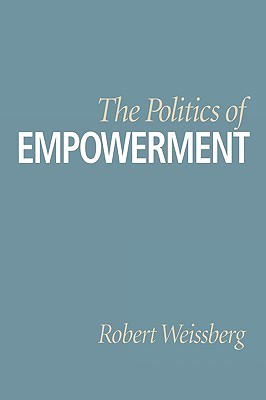Robert Weissberg produced the present volume, on the concept and practice of empowerment, almost simultaneously with another monograph, on tolerance, published last year. Both studies highlight the difference between a political ideal and its grim result—that is, between what people are told the ideal consists of and what they ultimately get. In Political Tolerance, Weissberg shows how the ideal of openness to dissent evolves from the simple acceptance of particular religious or cultural differences to the glorification of lifestyles and ideologies generally considered as obnoxious or even perverse. In The Politics of Empowerment, he argues that a similar evolutionary process is at work, from exhortations to help raise up the impoverished and marginalized to the shakedown of those deemed empowered amid a cacophony of claims and protests from selt-certified victims.
Weissberg covers a daunting range of topics, from the Empowerment Act passed by Congress in 1993 for the purpose of providing federal funds to economically impoverished communities to prescriptions for participatory democracy and calls for self-liberation by black, feminist, and “homeless” organizations. Despite the distinctions to be drawn among these groups, all contenders for empowerment illustrate the ultimately non-political nature of the problems for which political solutions are sought. For the most part, “a decent case could be made that [the Empowerment Act] merely rewarded numerous big-city Democratic mayors and was not a well-crafted instrument to alleviate poverty.” hi one possible exception to this rule—the city of Detroit, which created jobs after an infusion of federal funding—Weissberg shows that economic improvement resulted almost entirely from major auto industries agreeing to build plants in Detroit. In Atlanta, another major recipient of Empowerment Act funds, the use of federal funds went primarily toward subsidizing “administrative overhead.”
Most efforts at empowerment, according to Weissberg, lead to bureaucratization, increased power for the central state, and little benefit for the supposedly disadvantaged. There are two major reasons, according to Weissberg, why empowerment schemes yield these sorts of dividends. First, the advocates of empowerment projects do not recognize their own failure: “The term failure is almost unspeakable, and irrelevant; discredited theories are cherished as valued family heirlooms.” hi fact, failed plans serve “to justify yet more ill-conceived forays bringing personal rewards and opportunities to propagate radical ideologies.” Second, the problems that advocates of empowerment claim to be addressing are often not amenable to political solution: Some, such as the demands by feminists that the state be authorized to provide “a solution [to all their grievances] by overthrowing patriarchy,” are Utopian and delusional.
Other nonpolitical problems for which empowerment is demanded are low scholastic achievements among minorities, insufficient public attention to multiculturalism, and an unacceptably high unemployment rate in urban areas. It may be questioned whether any of these problems can or should be remedied by applying political coercion to outside groups. Multiculturalists are free to celebrate whatever they wish to celebrate in private institutions or under their own auspices. Cities like Detroit improve their financial climate by recruiting industrial support, not by extracting federal handouts that are used to enrich municipal administrators. Those racial minorities who are unhappy with their children’s grades or scholastic ineptitude can organize themselves to tutor, or to find tutors for, the young. They can open charter schools that stress real learning skills. Finally, they can and do vote for candidates of their choice, who, as Weissberg notes, devote more energy to complaining about racism, while lining their pockets, than to solving the crises for which they demand greater manipulative clout.
Weissberg raises the provocative question of why blacks imagine that their well-being improves in proportion to the public offices they hold. American Jews, as Thomas Sowell notes, acquired more wealth and influence than Irish-Americans while holding only a fraction of the number of political offices. One possible reason why, for several generations, Jews did better professionally than the Irish, according to Sowell, was that they ignored the allure of elected office, while applying themselves to occupations that did not require winning popularity contests to control and distribute public funds. In the end, the Irish did well despite, not because of, machine politics. They entered non-political professions and were able to prosper. The history of the Irish in America deserves to be noted by blacks who believe that once they elect—or get a congressional act to provide them with—enough black officials, they will close the social distance between themselves and whites and Asians.
Weissberg further observes that orderly government is impossible as long as people believe that they can get what they want by mounting noisy protests in search of special rights and benefits: “The easy insistence on power breeds insatiable appetites.” Though “conflict is endemic and healthy [in popular government] . . . it must be bounded. Democracy requires disputes be ended and defeats accepted.” On this last point, Weissberg is right in principle, less so in terms of the example offered. He calls attention to the argument—made by the American Founding Fathers, among others—that inner restraints on factional passions must exist in order to hold together a constitutional republic. From this perspective, one is justified in castigating most empowerment advocates for arousing envy and factionalism as well as for inciting the central government to plunder taxpaying citizens.
Weissberg, however, avoids the question of how to halt the constitutional derailment currently taking place. My own view is that it cannot be stopped, and that the present orgy of empowerment claims is the inescapable outcome of a deeply corrupt regime.
[The Politics of Empowerment, by Robert Weissberg (Westport, CT: Praeger Publishers) 272 pp., $45.00]

Leave a Reply